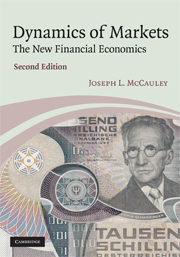Book contents
- Frontmatter
- Contents
- Preface to the second edition
- 1 Econophysics: why and what
- 2 Neo-classical economic theory
- 3 Probability and stochastic processes
- 4 Introduction to financial economics
- 5 Introduction to portfolio selection theory
- 6 Scaling, pair correlations, and conditional densities
- 7 Statistical ensembles: deducing dynamics from time series
- 8 Martingale option pricing
- 9 FX market globalization: evolution of the Dollar to worldwide reserve currency
- 10 Macroeconomics and econometrics: regression models vs empirically based modeling
- 11 Complexity
- References
- Index
2 - Neo-classical economic theory
Published online by Cambridge University Press: 02 December 2010
- Frontmatter
- Contents
- Preface to the second edition
- 1 Econophysics: why and what
- 2 Neo-classical economic theory
- 3 Probability and stochastic processes
- 4 Introduction to financial economics
- 5 Introduction to portfolio selection theory
- 6 Scaling, pair correlations, and conditional densities
- 7 Statistical ensembles: deducing dynamics from time series
- 8 Martingale option pricing
- 9 FX market globalization: evolution of the Dollar to worldwide reserve currency
- 10 Macroeconomics and econometrics: regression models vs empirically based modeling
- 11 Complexity
- References
- Index
Summary
Why study “optimizing behavior”?
Globalization via deregulation and privatization is supported by the implicit and widespread belief in an economic model that teaches the avoidance of government intervention in socio-economic life. The old laissez faire belief was revived in the Reagan-Thatcher era, and then gained ground explosively after the collapse of central planning in communist countries. The old fight through the 1970s was between the idea of regulated markets in the west and strong central planning under communism. The question for our era is whether markets should be regulated for social purposes, as they were in western Europe prior to the fall of the wall, or whether the current laissez faire binge will continue in spite of its inherent financial instabilities and the irreversible loss of jobs in previously well-off western nations. In particular, laissez faire teaches that regulations should have been avoided, and this has led to the peculiar problem that financial derivatives are a highly leveraged and unregulated form of credit creation. In contrast, the standard economic theory to be described in this chapter does not admit “money” in any form, shape, or fashion.
The “losing side” in the Cold War has adopted capitalism with a vengeance, and is now beating its former enemies: China and Russia, as of 2007, sit on the largest Dollar reserves in the world.
- Type
- Chapter
- Information
- Dynamics of MarketsThe New Financial Economics, pp. 10 - 28Publisher: Cambridge University PressPrint publication year: 2009



